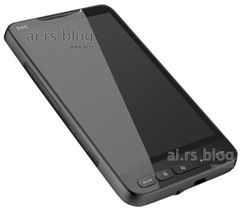 Location, Entertainment, Connectivity and Productivity. The four elements of a MID as proposed by Intel a few years ago (March 2007 although the label was ‘UMPC’ at that point. It changed to ‘MID’ a month later) It’s clear that it’s a winning combination because a lot of people appear to be moving in to cover the same ground.
Location, Entertainment, Connectivity and Productivity. The four elements of a MID as proposed by Intel a few years ago (March 2007 although the label was ‘UMPC’ at that point. It changed to ‘MID’ a month later) It’s clear that it’s a winning combination because a lot of people appear to be moving in to cover the same ground.
With the Web and social networking being two of the biggest growth areas in mobile computing we’re now seeing smartphone manufacturers addressing the area and the rumoured HTC Leo is a prime example.
4.3 inch screen, 800×480 resolution and a high-end Snapdragon processor in a stylish pocketable format. Sounds like a MID to me!
With an efficient ARM platform battery life should be reasonable and with the Windows 6.5 OS there’s a lot of application options too but will the built-in browser or Opera 9.5 mobile be enough? Without flash there’s going to be a huge chunk of the internet missing too. How’s the speed going to be? Devices like this and the Toshiba TG01 will be good benchmarks to compare against Intel MIDs against in the coming months, especially those based on the voice-capable Moorestown platform due by the end of 2009.
Intel isn’t alone in the MID market now and as it moves to a smartphone-capable platform, the mitts will be off for an all-out competition. Consumers only stand to benefit as the best of technology is paraded before them. The market should receive a boost as a result of the competition too so it’s great to see that the MID category has the seal of approval from everyone!











in the end it boils down to software.
that is, the availability of software that enable someone to do something that will put money in their bank account.
so far, the mobile platforms have been treated as the lesser cousin of the desktop/laptop, with cut back features, barely able to do basic editing and creation.
wintel have a legacy advantage if they can manage to bring the pc desktop to the pocket. Question is, will it be workable, given that most of that legacy is based on the assumption that a keyboard and mouse will be available.
in the end, the os and hardware is of lesser importance then the software one can run on it. And here software patents and similar is helping the old desktop gorillas fence of their area of the market from lean mean startups that would love to provide software that provide the full bang, but adapted for the new interfaces.